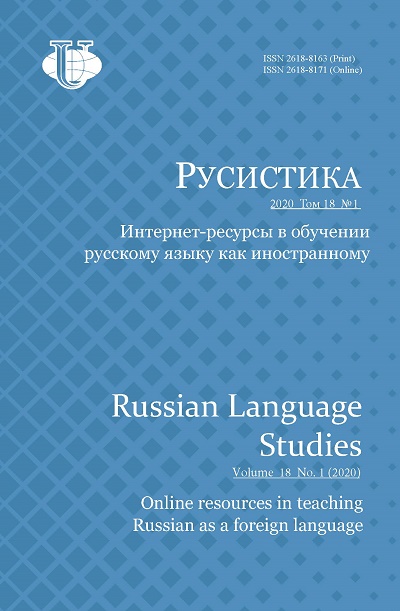Traditional and innovative content as the basis for project work in teaching Russian as a foreign language
- Authors: Korostova S.V.1, Nefedov I.V.1
-
Affiliations:
- Southern Federal University
- Issue: Vol 18, No 1 (2020): ONLINE RESOURCES IN TEACHING RUSSIAN AS A FOREIGN LANGUAGE
- Pages: 85-96
- Section: Mediadidactics and electronic means of instruction
- URL: https://journals.rudn.ru/russian-language-studies/article/view/23214
- DOI: https://doi.org/10.22363/2618-8163-2020-18-1-85-96
Cite item
Full Text
Abstract
The article proves the importance of using complex methods in project work when teaching Russian as a foreign language, including both traditional and innovative content: working with textbooks and video content. The practical use of this method is connected with educational texts about Southern Federal University, accompanied by lexical comments and a system of exercises to train lexical and grammatical skills. The suggested texts and links to corresponding online video content are meant to be used at the first stage of multimedia project work on the history of Southern Federal University and its modern state. Educational texts play an important role both in teaching Russian as a foreign language and in project work. In our opinion, educational texts should make the base of any project, be actively implemented on the stage of motivation and goal-setting. The material of educational texts develops speech skills, reading capacity, audio perception, and text recognition. Foreign students also understand how to plan their work within a chosen project. The students improve their capacity for forming utterances, taking part in discussions and dialogues in Russian, which is doubtlessly important for effective work on individual projects and their presenting. In our opinion, work with the multimedia content is more productive in video format. The article gives not only special educational texts about Southern Federal University, but also links to video clips and video films, as well as the structure of working with them.
About the authors
Svetlana V. Korostova
Southern Federal University
Author for correspondence.
Email: svetolen@yandex.ru
PhD, Associate Professor of the Department of the Russian Language
105/42 Bolshaya Sadovaya St., Rostov-on-Don, 344006, Russian FederationIgor V. Nefedov
Southern Federal University
Email: igornef@yandex.ru
PhD, Associate Professor of the Department of Theory of Language and Russian Language
105/42 Bolshaya Sadovaya St., Rostov-on-Don, 344006, Russian FederationReferences
- Andryuchshenko, O., Bakhralinova, A., Abzuldinova, G., & Kairova, M. (2017). Methodology of implementation of the project-based approach to the Russian language learning. Man in India, 97(15), 353–369.
- Beckett, G.H., & Slater, T. (2005). The Project Framework: A tool for language, content, and skills integration. ELT Journal, 59(2), 108–116.
- Blumenfeld, P.C., Soloway, E., Marx, R.W., Krajcik, J.S., Guzdial, M., & Palincsar, A. (1991). Motivating Project-Based Learning: Sustaining the Doing, Supporting the Learning. Educational Psychologist, 26(3–4), 369–398.
- Chernyshenko, O.V., Ogryzko, E.V., & Nefedov, I.V. (2017). Russkii yazyk kak inostrannyi. Lingvostranovedenie i razvitie rechi [Russian as a Foreign Language. Linguistic and Cultural Studies and Speech Development]: Manual. Moscow: Infra-M Publ. (In Russ.)
- Filippova, V.M. (2016). The Method of Projects and the Specifics of its Use in Teaching RFL in the Language Environment. Language, Culture, Mentality: The Problems of Learning in a Foreign Language: The Collection of Research Papers of the 15th International Scientific and Practical Conference. RGPU of А.I. Gertsen Publ. (In Russ.)
- Khodzitskaya, E.А. (2013). Meeting the Method of Projects. Science of the 21st Century: Questions, Hypotheses, Answers, (2), 82–85. (In Russ.)
- Mikhailova, I.V., & Vasyagina, T.V. (2014). Using Texts of Fiction in Teaching Russian as a Foreign Language. Prospects for Developing Scientific Research in the 21st Century (pp. 194–196). Makhachkala. (In Russ.)
- Navolokova, N.G. (2014). Characteristics of pedagogical technologies. Project Technology. Pedagogical Workshop. Everything a Teacher Needs!, 7(31), 34–37. (In Russ.)
- Nefedov, I.V. (2016). M-learning i E-learning kak osnova razrabotki sovremennykh uchebnykh programm po metodike prepodavaniya RKI [M-learning and E-learning as a Basis for Developing Modern Educational Programs on Methods of Teaching RFL]. The 10th International Readings Dedicated to Cyril and Methodius: Collection of Studies. Sevastopol. (In Russ.)
- Nefedov, I.V. (2018). Video-Content and Mobile Technologies in Project Activity for Teaching Russian as a Foreign Language. SFedU News. Philological Sciences, (2), 168–179. Rostovon-Don. (In Russ.)
- Nefedov, I.V., & Popova, K.А. (2016). M-learning as an Innovative Means of Teaching RFL. SFedU News. Philological Sciences, (3), 170-178. Rostov-on-Don. (In Russ.)
- Petersen, C., & Nassaji, H. (2016). Project-based learning through the eyes of teachers and students in adult ESL classrooms. Canadian Modern Language Review, 72(1), 13–19.
- Polat, E.S. (2000). Metod proektov na urokakh inostrannogo yazyka [Method of Projects at the Lessons of Foreign Language]. Inostrannye yazyki v shkole [Foreign Languages at School], (3), 3–9. Retrieved October 17, 2019 from: http://schools.keldysh.ru/labmro/ lib/polat3.htm
- Prezentacionnye roliki universitetov [University Presentation Videos]. Retrieved October 20, 2019 from: https://www.youtube.com/watch?v=QBuNJBaMgTU; https://www.youtube.com/ watch?v=34ViU_U5KmM; https://www.youtube.com/watch?v=TCvRSKd3SuQ
- Savilova, S.L., & Davaasurehn, S.H. (2016). Proektnaya deyatel'nost' kak metod povysheniya motivatsii na urokakh RKI [Project work as a Means of Increasing Motivation at the Lessons of RFL]. Professional Preparation of Students of a Higher Technical Education Institution in a Foreign Language: Methodical Preparedness of Teachers: Materials of the 3rd All-Russian Scientific-Methodological Seminar-Conference. Tomsk Polytechnic University Publ. (In Russ.)
- Vykhanovets, N.A. (2015). Regional'nyi komponent kak osnova kul'turoorientirovannoi metodiki prepodavaniya RKI [Regional component as the basis of culture-oriented teaching methodology for RFL]. Uchenye zametki TOGU [Scientific notes of PNU], 6(4), 424–428. (In Russ.)
- Woods, P. (1988). Pulling out of a project: Twelve tips for project planners. ELT Journal, 42(3), 196–201.















